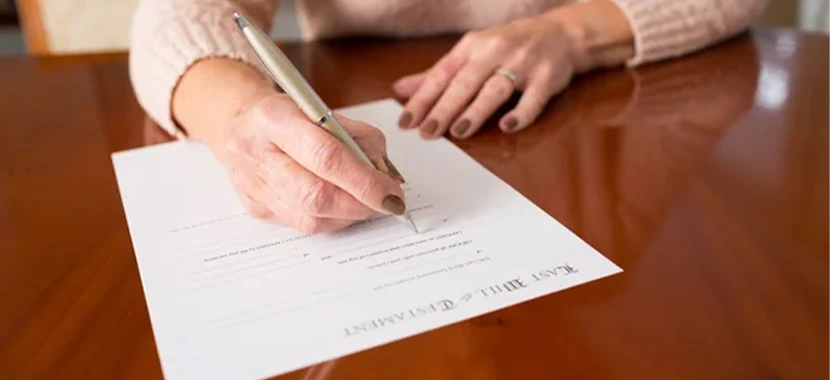Thinking of writing your will by hand? In Florida, you absolutely can—but there are important rules to follow to make sure it holds up in court. The idea of putting your final wishes on paper might seem straightforward, but the details matter.
Florida’s laws on handwritten wills can save your loved ones from headaches and legal battles later on.
At the Law Office of Cameron H.P. White, P.A., we understand how important it is to get this right. Let’s explore what it takes to create a valid handwritten will, what to watch out for, and why professional guidance can be a game-changer.
What Is a Will?
A will, simply put, is a legal document where you spell out how your assets—like property, money, or personal belongings—should be distributed after you pass away. It’s also where you can name guardians for your children, pick someone to handle your estate, and leave instructions for any specific wishes.
Without a will, the state steps in and decides how to distribute your belongings through a process called intestacy. This might not align with what you had in mind, which is why having a will is so important.
Handwritten Wills: Florida Law
The good news? Florida does allow handwritten wills—but there’s a catch. They must meet strict legal requirements to be considered valid. Let’s clear up some confusion about two common terms: handwritten wills and holographic wills.
Handwritten Wills
These are exactly what they sound like—wills written by hand. These are valid as long as they meet all the legal requirements under Florida Statute 732.502.
Holographic Wills
These are handwritten wills that are not witnessed. Florida does not recognize holographic wills. So, even if your handwritten will is beautifully done, it won’t be valid unless it’s properly witnessed.
Requirements for a Valid Handwritten Will
To create a valid handwritten will, it’s important to follow the legal requirements laid out in Florida Statute 732.502. Here’s what you need:
The Entire Will Must Be in Writing
First and foremost, your will must be written. This can be handwritten or typed, but every part of it needs to be clearly documented. If you choose to write it by hand, make sure your handwriting is neat and legible to avoid any misinterpretation.
Florida courts won’t accept a verbal declaration or a partially written will—it has to be fully in writing to meet the legal standard.
The Testator’s Signature Is Essential
The person making the will, legally known as the testator, must sign the document at the very end. This signature shows that the will reflects your decisions and that you approve its contents. Without your signature, the will is not legally valid.
It’s important to sign exactly where indicated, as placing your signature in the wrong location could cause unnecessary legal complications.
Witnesses Must Be Present and Sign the Will
The state law requires two competent adults to witness the signing of your will. These witnesses must be present at the same time and see you sign the document. Afterward, they also need to sign the will in your presence and in the presence of each other.
The witnesses should not be beneficiaries or have any interest in the will’s outcome. Their role is to confirm the authenticity of your signature and ensure that the will reflects your true intentions, free from undue influence.
Notarization: Helpful, But Not Required
While notarization isn’t mandatory for a handwritten will to be valid in Florida, adding a self-proving affidavit can streamline the probate process. This notarized affidavit is signed by you and your witnesses, and it confirms the will’s authenticity.
When a will includes a self-proving affidavit, the probate court doesn’t need to call the witnesses to testify, saving time and effort. Although it’s optional, this extra step adds a layer of protection and helps prevent disputes over the validity of your will.
Potential Issues with Handwritten Wills
While writing your will by hand might seem simple, there are some common pitfalls to watch for:
While writing your will by hand might feel like a simple solution, it can lead to some unexpected challenges:
- Legibility: If your handwriting isn’t clear, it could create confusion or lead to misunderstandings about your wishes. In some cases, an illegible will might even be ruled invalid.
- Clarity: Legal language has a purpose—it eliminates guesswork. Without precise wording, a handwritten will can be open to interpretation, which might cause disagreements among your loved ones.
- Completeness: It’s easy to overlook important details, like naming an executor, appointing guardians for minor children, or clearly identifying who gets what. Missing these key elements can cause unnecessary complications.
- Witness Requirements: Florida law requires two impartial witnesses to sign the will in your presence. Finding individuals who meet these criteria and are available at the same time can sometimes be tricky.
- Risk of Disputes: Handwritten wills often face more scrutiny in court, making them more likely to be challenged. Even small errors or unclear instructions can lead to legal battles between beneficiaries.
Protect Your Legacy: Contact Cameron H.P. White, P.A.
At the Law Office of Cameron H.P. White, P.A., we believe that everyone deserves the peace of mind that comes with a solid estate plan.
Whether you’re considering a handwritten will or prefer a professionally drafted one, our firm is here to guide you through the process with care and attention to detail.
Don’t leave your loved ones with unanswered questions or unnecessary stress. Call us today at 407-792-6011 to schedule a consultation. Let’s work together to ensure your legacy is protected and your wishes are honored.
Your future—and your family’s future—deserve nothing less.

